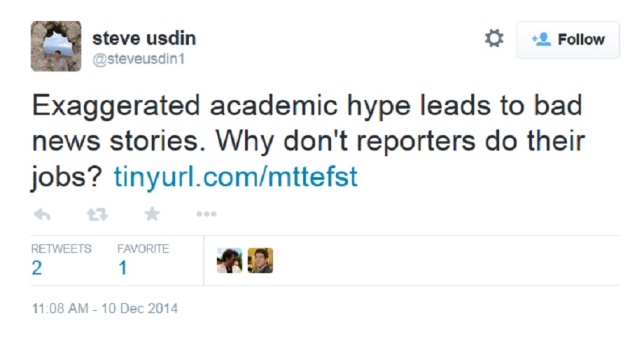Study Points to Press Releases as Sources of Hype
By Chris Woolston,
Nature News
| 12. 12. 2014
Untitled Document
Researchers love to blame the news media when reports about science are misleading or even wrong. But a December study1 making the rounds online suggests that much of the hype and misinformation about health-related research in the news has its roots in university press releases — which are almost always approved in advance by the researchers themselves. “Academics should be accountable for the wild exaggerations in press releases of their studies,” tweeted Catherine Collins, a dietitian who works for the National Health Service in London. But some say that others are to blame. Steve Usdin, editor and co-host of BioCentury This Week, a US public-affairs show covering the biopharma industry, tweeted:
The study, published in the British Medical Journal (BMJ), examined 462 press releases produced by the leading 20 UK research institutions in 2011. Overall, 40% of those releases contained health advice that was more explicit than anything found in the actual article. One-third emphasized possible cause and effects when the paper merely reported correlations. And 36% of releases about studies of cells...
Related Articles
“Donald Trump” by Gage Skidmore
is licensed under CC BY-SA 2.0.
On October 7, Donald Trump’s long-standing promotion of eugenics finally attracted widespread and prominent media attention. Here are a few examples, all posted just in the first hours after Trump’s harangue on a radio podcast about immigrants’ genetic propensity to murder:
- ‘Very sinister’: Trump stuns Republicans and Dems with on-air ‘bad genes’ rant, Kathleen Culliton, Raw Story, 10/7, 10:15 am
- Saying immigrants bring ‘bad genes’...
By Gary Marcus, The Guardian | 08.03.2024
By Julia Black and Margaux MacColl, The Information [cites CGS' Katie Hasson] | 07.19.2024
When venture capitalist Jack Abraham first began dating his wife, Gabriella Massamillo, he insisted on one condition: that when they were ready to have children, she’d be willing to conceive using in vitro fertilization. Abraham had lost both his mother...
Image courtesy National Human Genome Research Institute
The U.S. Food and Drug Administration (FDA) is supposed to encourage effective medical advances while also ensuring that patients and research subjects are protected. This dual mandate demands tricky judgment calls that are made more difficult by outside pressures of several kinds, political, judicial, and especially commercial. This April story at Bloomberg examines one deeply troubling pattern of regulatory capture:
Americans Are Paying Billions to Take Drugs That Don’t Work
Companies are increasingly...




